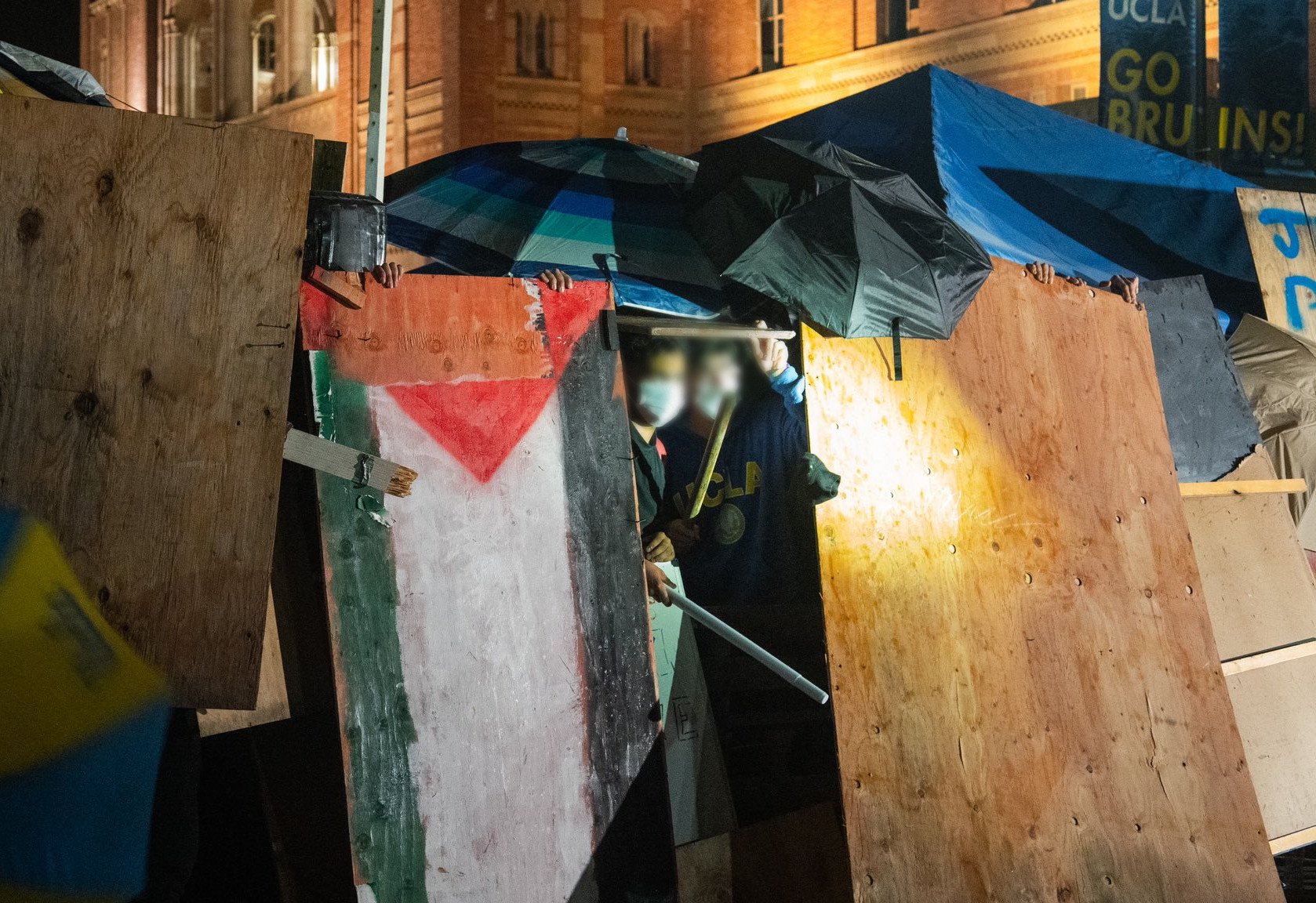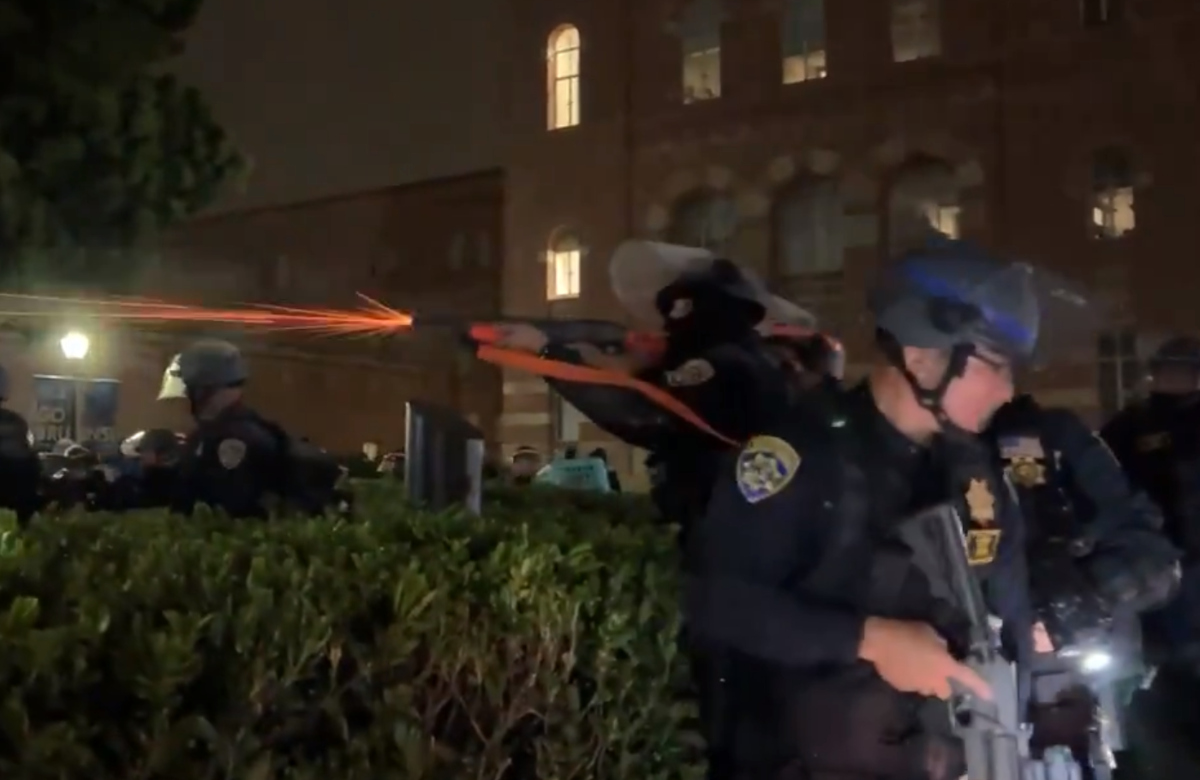Filed under: Featured, IGDcast, Interviews, Radio/Podcast

Podcast: Play in new window | Download
Subscribe: RSS
On this episode of the It’s Going Down podcast, we are joined with a guest who discusses the mass mobilization to defend the Palestine Solidarity Encampment at UCLA in Los Angeles, CA, which was attacked by far-Right Zionists on April 30th and then by hundreds of riot police on May 1st, who made over 200 violent arrests.

During our discussion, our guest breaks down how the UCLA encampment grew in the face on continued harassment and attacks from far-Right pro-Israel counter-protesters. These attacks escalated on April 30th, when a group of Zionists attacked barricades erected around the outside of the encampment, in full view of security and police, who left the area and watched the attack. As people defended themselves from violent counter-demonstrators, clashes escalated, lasting into the early morning. The next day, police then used the attack as a context for carrying out a violent raid of the encampment, shooting and injuring students and community members with projectile weapons.
As the New York Times wrote:
[An] examination of more than 100 videos from clashes at the University of California, Los Angeles, found that violence ebbed and flowed for nearly five hours, mostly with little or no police intervention. The violence had been instigated by dozens of [far-Right Zionists] who are seen in videos counterprotesting the encampment.
The videos showed counterprotesters attacking students in the pro-Palestinian encampment for several hours, including beating them with sticks, using chemical sprays and launching fireworks as weapons. As of Friday, no arrests had been made in connection with the attack.
The melee began when a group of counterprotesters started tearing away metal barriers that had been in place to cordon off pro-Palestinian protesters. Hours earlier, U.C.L.A. officials had declared the encampment illegal.
Security personnel hired by the university are seen in yellow vests standing to the side throughout the incident. A university spokesperson declined to comment on the security staff’s response.

Police shoot off riot shotguns at UCLA encampment.
TruthOut reported:
Los Angeles Times higher education journalist Teresa Watanabe reported that members of the pro-Israel mob used explicitly genocidal language as they ripped down encampment barriers, yelling, “Second Nakba!” — a reference to the forced displacement of hundreds of thousands of Palestinians from their homes in 1948.
“For over seven hours, Zionist aggressors hurled gas canisters, sprayed pepper spray, and threw fireworks and bricks into our encampment,” organizers said. “They broke our barriers repeatedly, clearly in an attempt to kill our community.”
“Law enforcement simply stood at the edge of the lawn and refused to budge as we screamed for their help,” the statement continued. “The only means of protection we had was each other. We keep each other safe.”
The Daily Bruin, which had student reporters on the scene, reported that “security and UCPD both retreated as pro-Israel counter-protesters and other groups attacked protesters in the encampment.”
As we cover on the podcast, the far-Right Zionist and police violence on full display at UCLA exposes the false claims by the Biden administration and campus leaders across the country; growing police repression of campus demonstrations is aimed at crushing the anti-war movement which threatens US military interests, not to “protect students” or ensure their “safety.”
The successful mass defense of the UCLA encampment from the far-Right is a turning point for the movement. As one person posted on social media following the clashes, “Everyone at UCLA should feel incredibly proud of themselves. Fighting the cops is where all our movements will have to go, and they’re correct to do it and brave to face it.” Another account added, “There were thousands of people at UCLA who didn’t back down and battled to defend the camp. We will never forget what that night was like. So many people came out in solidarity.” Throughout our discussion, we talk about the dynamics on the ground, the various forces at play, and where the movement might go next.
Music: No$hu, “The Bonk Song”





